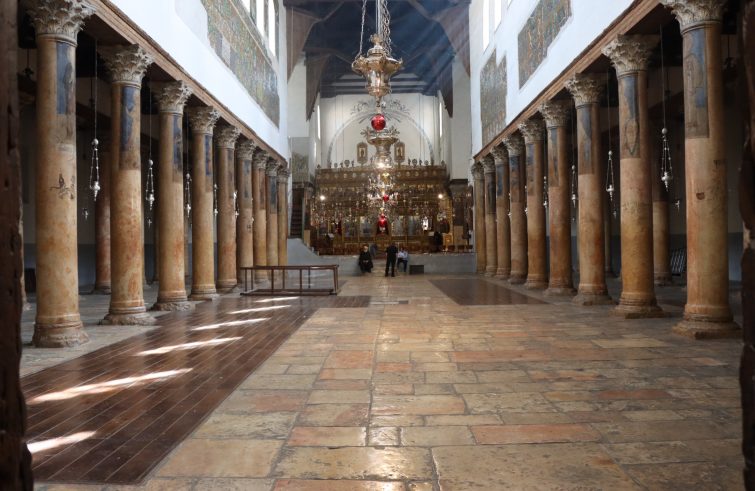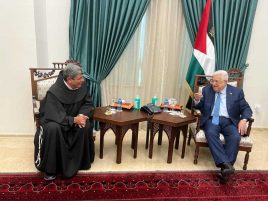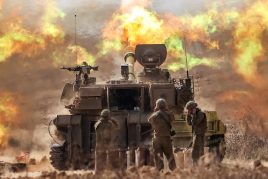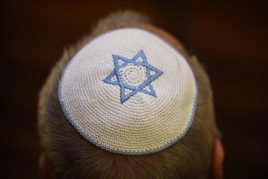
“In the Holy Land, there is a before 7 October and an after 7 October, like 9/11 for the United States. People are afraid to go out. There is no one in the streets. Some areas have been sealed off for security reasons. People are afraid”. Father Ibrahim Faltas, Vicar of the Custody of the Holy Land, described the “atmosphere” in Israel, the West Bank and Gaza after the Hamas terrorist attack on Israel. Speaking to participants at the 20th Ordinary National Assembly of the National Federation of Catholic Weeklies (FISC) held in Rome over the past few days, the friar mentioned the city of Bethlehem, the heart of Christmas celebrations in the coming weeks: “It is a dead, enclosed, empty, deserted town. It is very complicated to enter and to leave. So many people want to leave. Christian families want to take their children with them, saying they have no future there. The war is not only in Gaza, but also in the West Bank. Where is Hamas going? Where is Israel going? These are the questions we are asking ourselves today.” SIR interviewed the Vicar of the Custody of the Holy Land on the sidelines of the FISC assembly.
 Father Faltas, next Sunday, December 3rd, the Advent season will begin. What kind of Christmas will it be for Gaza and Bethlehem?
Father Faltas, next Sunday, December 3rd, the Advent season will begin. What kind of Christmas will it be for Gaza and Bethlehem?
“It will be a sad Christmas. We are surrounded by death, casualties, rubble and suffering. Everything in Gaza is destroyed. Not a single Christian family has a home, they are all displaced in the Latin parish, over 700 people, and in the Greek Orthodox parish of St Porphyrios. The same situation exists in the West Bank and in Bethlehem, where the number of arrests, deaths and casualties is high. In the birthplace of Jesus, now closed and deserted, there will be no Christmas celebrations; there will be no Christmas lights and no Christmas tree in the Manger Square. On the 2nd of December, the eve of the first Sunday of Advent, the Custos of the Holy Land, Father Francis Patton, will enter the city in keeping with tradition, but there are some difficulties to be resolved due to the current circumstances. Christmas will therefore be entirely centred on the Midnight Mass celebrated by the Latin Patriarch, Card. Pierbattista Pizzaballa. In the last few days I had talks with the Palestinian President Abu Mazen and with Pope Francis. We expect President Abu Mazen to attend the midnight Mass in Bethlehem. He said he would come. The presence of Palestinian presidents at Midnight Mass goes back to 1995 with Yasser Arafat.
 More than 50 days have passed since 7 October and people are still wondering how such a terrible event could have happened….
More than 50 days have passed since 7 October and people are still wondering how such a terrible event could have happened….
What everyone thought could never happen did happen on 7 October, a tragedy that no one can explain: in just a few hours, 1,400 Israelis were killed and 5,000 wounded, a veritable “Black Sabbath”. Many people in Israel – and abroad – are wondering how this could have happened, and someone will have to provide the answers. Our hope now is that the ceasefire will continue after the agreed release of the hostages. I am sure that Egypt, the US and Qatar, who brokered this agreement, are working for a continuation of the ceasefire and the release of all the hostages. None of these countries, led by Biden, want to see a continuation of the war, not only in Gaza but throughout the Holy Land. It is impossible to describe what we have seen in these more than 50 days of war, a hell on earth. I have been living in the Holy Land for the past 35 years, I lived through the first and second Intifadas, the siege of the Church of the Nativity, but I have never seen anything like this.
 Do you still believe in peace between Israelis and Palestinians after what has happened?
Do you still believe in peace between Israelis and Palestinians after what has happened?
Living together is the only solution, it is the destiny of these two peoples. I think that now is the time to talk about negotiations, to talk about peace, because after so much death, destruction and suffering, we have to say that enough is enough, no more war, no more blood, no more revenge. The time is ripe for reviving the “two Peoples, two States” solution. That is the task of the international community. It was on the agenda for 70 years, but then war broke out again, with the innocent always suffering the most. What we need now is a just, sustainable and lasting peace. All the world’s leaders have visited the Holy Land, they have all talked about the Two-State solution, but no one has ever delivered. They must set a date for this to take place, a date when there will be the Palestinian state that everyone must recognise. John Paul II used to say that there will never be peace in the world until there is peace in Jerusalem. The heart of the world is the Holy Land, the heart of the conflict is Jerusalem. If a solution is found for the Holy City, we will have peace. Jerusalem must be a city open to all, as has always been the desire of the Holy See.











